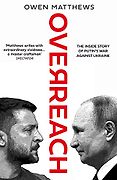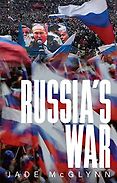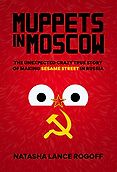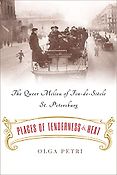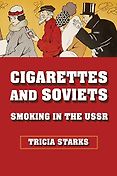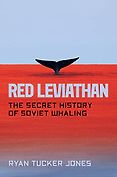You’re the chair of the judges of this year’s Pushkin House Book Prize. Before we get to the books that made the shortlist, can you tell me a bit about the prize and what kind of books you were looking for?
Pushkin House is a long-established organization dedicated to cultural exchange and communication between the United Kingdom and Russia. It was established at the time known in Russian historiography as the ‘thaw’—the partial liberalization at the beginning of the 1960s—and it has carried on ever since. It is an independent institution, so it is not connected to anything Russian state-related or, for that matter, English-state related. That’s the great advantage of being part of the jury of the Pushkin House Book Prize—you are not dependent on any official body.
The criteria for the prize are very broad. The prize is awarded yearly for the best nonfiction book on Russia in English. This includes translations from other languages, including Russian. It’s a very broad frame within which you can fit any number of texts published within a given year.
What the jury is trying to do is find a balance between being subjective, which is inevitable, and trying to be objective, which is difficult, since the jury consists of people, and people have their tastes and their specific professional distortions which make them look in a certain direction. For example, I’m a political scientist, so my nonfiction book choices on Russia are mostly political science books. That’s why I was trying to squeeze books like the dictionary of Russian Political Philosophy onto the shortlist. I understand it’s not everybody’s cup of tea, but for me, it’s a very interesting and ambitious venture.
Other people have other angles, other professions, other platforms from which they look at things. No one can read all the books. No one can even grasp the scope of titles published every year in the English language, which is widely used across the globe. There are a lot of books and among them are a lot of books on Russia. We cannot presume to even be aware of all that has been published. That’s the subjective side of things.
“We are striving to be with the times”
At the same time, the jury is chosen to consist of people who can broadly be called public intellectuals. They are supposed to be aware not just of their own specific fields of competence or expertise or work, but of the general way in which the world is going. We are striving to be with the times. We are trying to balance the inevitable subjectivity with a very desirable objectivity.
What we have come up with is first a longlist, which we don’t make public. From that list, each jury member chooses four to eight favorite books. Whenever a title is chosen by at least two jury members, it goes onto the shortlist. Last year, when I was also a member of the jury, our so-called shortlist was 10 titles long, which was not short at all. This year, we have tried to keep ourselves more within limits and we have six.
So using this simple technique we have come up with this list of six titles. They’re good at achieving what we were striving for, which is to balance the inevitable domination of one single topic—because books on Russia published in 2022 will be pretty much about the war. We do have books about the war. But we did not want to limit our view to just this one topic—all important as it is—because book writing and publishing is a slow trade. People who have pursued their topics with integrity and passion deserve to be noticed, even if the world has turned in a different direction. You’ve spent years writing about Muppets or cigarettes, or the queer sub-world in imperial Russia and when your book comes out, it would be unfair to have it missed by the public because all attention is focused on something else. I’m not saying that we have managed some miracle of harmony, but we have tried our best.
I was looking through the list and started reading the books. They’re very readable and not too academic or dry.
You should have read my selection of books! I strongly suspect they would be pretty unreadable to anyone except myself and my colleagues. But it’s fortunate that I’m not the only person on the jury.
Let’s go through the books. I’m going to start with the two books about the Russia-Ukraine war because I think a lot of people want to understand it more and would love some direction on which books to read about it. First on the list is Overreach: The Inside Story of Putin and Russia’s War Against Ukraine by Owen Matthews. What did you like about this book and why did it end up on the shortlist?
This is a remarkable book. Owen Matthews is a very experienced journalist with a quarter of a century history of working as the Moscow correspondent of various world media. He’s well-known to the Russia-watching community and he has written a number of books. In my personal opinion, this book has the best possible title: Overreach. It’s one of those cases where a word is spot on. It symbolizes the whole complex thing in just one word.
I remember reading an academic article that started with the phrase ‘this misbegotten war.’ This epithet struck me as so fitting. It’s very Shakespearean, but it also describes what this was.
It’s the same with Overreach. You have a nice little plan which you’re sure will succeed. You have done the same thing before, and it went fine. Then you do it again, but on a larger scale, and everything collapses around your ears. You have overplayed your hand.
Both for this book and the other book about the war on the shortlist—Russia’s War by Jade McGlynn—there is a self-evident problem. Events are unfolding before our very eyes. The public is expecting answers, prognoses, prophecies, answers. There’s a demand which is being answered, but it is a difficult and risky thing to write something so final as a book. A book is a body, a world in itself. After the last word you have written, you put a full stop and your cozy little universe is complete. But the very un-cozy, big universe around you and your book continues to develop. There’s that story about Zhou Enlai, when he was asked about the consequences of the French Revolution, and he said it was too early to tell. It is much too early to tell anything about this war. And yet people write books, which is a very brave thing to do.
What’s good about Matthews’s book is that because he’s a journalist he’s used to describing processes which are ongoing. Journalists tell stories which are developing. He does not provide answers. He’s not finalizing anything in the book.
It’s more of an attempt to describe than to analyze. But it is analytical in the sense that it focuses on propaganda efforts, which again, being a journalist, he is good at doing. He’s dissecting the Russian misinformation machine, the propaganda machine which has managed to both lay the groundwork and mislead its own leadership into embarking on this misbegotten war. That is what makes this book so interesting. It’s humble. It does not present the author as knowing all the answers, which is also true about Jade McGlynn’s book.
Is Owen Matthews trying to get inside Vladimir Putin’s mind, to see what caused this decision to invade Ukraine?
He’s trying to do what I, as a political scientist, would call dissecting the decision-making process. It’s not exactly getting into somebody’s head: that evidently is impossible. He’s describing the Russian decision-making system in general, the political machine or the black box, as David Easton called it, which processes demands and makes them into political decisions. He is using his experience as a journalist, including his insider knowledge and his connections with people in Russia who tell him things. He focuses specifically on the propaganda machine and the informational sphere, which I think is quite valuable.
Let’s move on to Russia’s War by Jade McGlynn. She is an academic who focuses on media, memory and politics in Russia and takes a slightly different approach, I think. Tell me more.
The very title of the book is provocative in that it poses a certain point of view. There has been a dispute going on since the beginning of the war about whether this is Putin’s war or Russia’s war. I’m in Germany, and the quasi-official position here is that it’s Putin’s krieg. It’s not a war that the Russian nation is waging against the Ukrainian nation—it’s a campaign led by the Russian authoritarian leadership.
What the author of this book is trying to do is analyze the state of mind of the Russian people. She focuses on public opinion trends. Like Matthews, she is very into information and disinformation and the Russian propaganda machine, which is a fascinating subject. I used to admire Peter Pomerantsev’s book, Nothing Is True and Everything Is Possible: The Surreal Heart of the New Russia (2014). He’s more of a Vladislav Surkov fan than suits my fancy—I think he overromanticizes our presidential administration and its internal policy department—but that’s a very good book on this riveting subject.
“This is a war that cannot be won—and should never have been waged in the first place”
Russia’s War is about the official public narratives that are produced and used by this propaganda machine. It tries to address a very difficult question—which I don’t think has an answer—which is whether this pro-war, aggressive narrative peddled by Russian propaganda has been developed by the system or not. Is it the system that produces meanings, taking messages from the Kremlin and transforming them into something which is consumable for the public? Or, and this is the darker version, is the system capturing and transmitting messages from the people and weaponizing them? Does the system say what the Kremlin orders it to say, or does it say what the public wants to hear?
The author does not provide an answer, at least as I read it. It’s a difficult question because in an autocratic environment you do not answer demand, you create it. Then you can spread the blame by saying, ‘This is what the people wanted! You see how well the audience consumes it!’ But how can it not consume it, if it’s the only offer on the table, if you have killed off and silenced all the other voices?
These are some of the complications that are addressed in the book. That is what makes it so interesting. And I, as a Russian, am glad the author reaches no definite conclusion: the title is more decisive than the book.
Okay, let’s move to the other books on the shortlist. First up is Muppets in Moscow, by Natasha Lance Rogoff, which is about her experience of bringing the American TV show, The Muppets, to Russia. The book is also interesting because it’s set in the 1990s, this period when it seemed as if all was going to go well in Russia, and everybody was excited about a democratic future. Tell me about this book and why you like it.
How can one not like a story about Muppets? Also, it’s my childhood. I remember those Muppets when they appeared on TV. I was the child who was watching Soviet TV, which if you were fortunate, had ten minutes per day of a show called “Good Night, Little Ones!” I remember the day it was cancelled because Konstantin Chernenko died. I never forgave the Soviet regime because I was sitting there waiting and then some sad music was played by an orchestra. I asked why and was told that the General Secretary of the party was dead, bless him.
In this milieu, suddenly, at the beginning of the 1990s, there was this onset of multicolored, completely stylistically and ideologically different things. I remember Disney appearing and watching my first fairy tale; I’ll never forget it. And I remember the Muppets. What struck me most—and I suspect this is what struck other Soviet people too—was the colors. We were living in a very sensory-deprived environment, in a very drab atmosphere. There were hardly any colors. These creatures looked like nothing we had ever seen before. They wore these nylon, bright colors. They had these long arms and legs. They were singing in chorus. There were songs! Sometimes it was hard to understand what the story was about because it was so different, but it was pretty riveting.
To now read the story behind all this and how this Muppet show appeared in Russia, is very, very interesting. It is escapist reading, I must confess. It takes you back to those times when, as you said, we were thinking that things would go so well, so quickly. When nothing was impossible. When whatever was impossible yesterday was the new reality today. We can hardly hope for such a coincidence of circumstances again, but they say every generation has its nostalgia, and our generation-specific nostalgia is for the brightness, the newness and the limitless possibilities and risks of the 1990s.
Is it also quite funny? Just the idea of American Muppet culture meeting Russian sensibilities…there must have been some good moments in the book.
The story is sometimes funny but when you’re no longer a child, you understand that the 1990s were not just about bright colors. It was also an extremely dangerous decade and many of its realities were pretty grim. The description of the book on the Pushkin House website puts it nicely, I think. It says that the author describes her subject “with a sharp wit and compassion for her colleagues.” That’s a good formula.
Let’s go on to the next book, Places of Tenderness and Heat by Olga Petri. What’s this book about?
This is about St. Petersburg at the end of the 19th century and what we would today call LGBT culture, in this specific time and place. It’s mostly about male homosexuality and the way people escaped the attentions of an absolutist monarchy and profited from newly found freedom in the first years of the 20th century. It’s also about the way this very private, very hidden culture influenced the public cultural sphere—because many were cultural figures: writers, dancers, poets, etc.
It’s a book about a period that we think we know about because we call it the ‘Silver Age’ culture. It is very much a cult in Russia. We cherish the memories and the aesthetics and the heritage of this epoch. The ‘Golden Age’ is Pushkin’s era, and the Silver Age is this period of decadence. It has all the charms of a doomed world. You read about it knowing that in another five or ten years, it will be crushed and completely obliterated out of existence. That is what gives it this specific brightness and visibility that is only given to doomed things.
I have read a couple of reviews of the book which criticize it for not revealing anything new. But what is known to some people is absolutely unknown to others. I certainly did not know most of what I read in the book and made a lot of discoveries. It captures a unique moment in Russian history from an angle that we seldom see described in print. Maybe this surprise shows me to be Russian. This book will certainly not be published in Russia anytime soon because of our specific legislation.
Let’s go to the next book, Cigarettes and Soviets: Smoking in the USSR, by historian Tricia Starks. Why did the judges pick this book for the 2023 shortlist?
This book belongs to a genre of historical nonfiction which I think is very much worth encouraging and that is the history of everyday life. We have, perhaps, too much history focusing on the leaders, the führers, the kings, the military dictators, and the big events in history. But that’s not what people’s lives consist of. When you take a topic like this, you are suddenly looking at things which you think you know from a very different angle. This gives you a new perspective and makes your world picture more complex.
I would compare Cigarettes and Soviets to a book which I read in Russian recently, and which I liked very much. It’s the history of Soviet shops called Torgsin or ‘trade with foreigners,’ which existed for a few years in the 1930s. Most Russian readers know about it from certain excerpts in The Master and Margarita where the heroes, the Devil’s assistants, come to one of those glittering luxury shops and burn it down. This book was a work of economic history and it suddenly showed what Soviet industrialization was all about. Torgsin was a mechanism for squeezing things out of hungry people—like jewellery, gold, or czarist money which they might have hoarded—and making them trade it for flour to make bread, for example. That was then turned into hard currency that was given to the West in exchange for industrial equipment and machinery for the Soviet army. It’s like seeing a person’s skeleton. Once see it, you cannot un-see it. That’s what comes from studying these little details like Torgsin, which is not on the front page of your history book.
Five Books interviews are expensive to produce. If you're enjoying this interview, please support us by donating a small amount.
The same applies to Cigarettes and Soviets. Soviet society was very much given to smoking. Even after Soviet times, we Russians still smoke more than comparable societies in Europe or North America. The Soviets were not much into preventing people from smoking. Until very late, there were hardly any anti-tobacco campaigns. On the contrary, there was a campaign to make people smoke, because that was how the state made profits. The same applied to the state encouraging people to drink because the state profited from the vodka trade.
It seems innocent. It may be comic, because the book has all those old Soviet ads, telling people how great it is to smoke a cigarette. But behind this, you see a very, very cannibalistic state. Again, once you see it, you can’t un-see it and once you understand it, you’ll start seeing it everywhere.
It’s surprising because at the beginning of the book it describes how Lenin was very anti-smoking. He absolutely hated it and wouldn’t allow anybody to smoke around him and yet…
Yes, he did not create a tradition in this respect. Nobody listened to him. That was his personal preference, but when the state needs to make money, nobody’s tastes are taken into account, not even the General Secretary’s.
Let’s turn to the last book on the 2023 shortlist. This is Red Leviathan: The Secret History of Russian Whaling by Ryan Tucker Jones, who is an environmental historian. Tell me about this book.
I cannot judge whether it’s really a secret history or not, because before I came across this book, I knew absolutely nothing about whaling, whether Soviet or not. It was all an undiscovered country to me. I did congratulate myself on the good fortune of being on the jury, because it gives you access to books on topics which you would never ever have read on your own. Now, I understand a little bit—about the parts of the whale, for example. I have learned a few new words in the process, that were not within the previous limits of my experience.
But if you want my impression of the book as a political scientist, it is the same story of a state eager to make money. Specifically, to have something which can be sold to the West for hard currency which the Soviets could then use to buy things we could not produce ourselves. It begins to make me think that finding something to sell was the entire raison d’être of the Soviet Union’s existence—be it wood, be it grain, be it gold, be oil and gas, or whales. It seems to have been the rationale for many things, which we are used to explaining in a different, much more roundabout way.
What this author calls the tragic Soviet experiment (a phrase which I think applies to more things than just whaling) was about the predatory use of nature—like the predatory use of its own populace, like the predatory use of everything—and this led to destruction. The whaling was as anti-ecological as you can imagine. It was run by people who did not give a thought to anything resembling sustainability, not even to preserving their own resource base. They never thought about it. Again, I’m harping on about the same theme. But I do think that the further away we get from Soviet times, the more it stands out in its unprecedented inhumanity, including to whales.
Looking forward to new books coming out now, have you read Serhii Plokhy’s latest book?
I haven’t read it but I hope I will get the chance. He’s an author who is always worth following.
There was another book which I wanted on the shortlist, Alexander Etkind’s Russia Against Modernity, which was published in April. It’s a short one, more of an extended article than a book, which makes it even more readable. Etkind is a well-known thinker. He’s currently at the Central European University in Vienna. He was in Florence for many years. He is the author of Internal Colonization: Russia’s Imperial Experience. It’s his term, actually. This book is about Russia’s war as a war against modernity, an attempt to stop time. That is also an overreach. This is a war that cannot be won—and should never have been waged in the first place.
Tickets are now on sale for this year’s Pushkin House Book Prize Award Ceremony, to be held on Thursday, 15 June, 2023 in London.
Interview by Sophie Roell, Editor
May 30, 2023. Updated: July 1, 2023
Five Books aims to keep its book recommendations and interviews up to date. If you are the interviewee and would like to update your choice of books (or even just what you say about them) please email us at [email protected]


